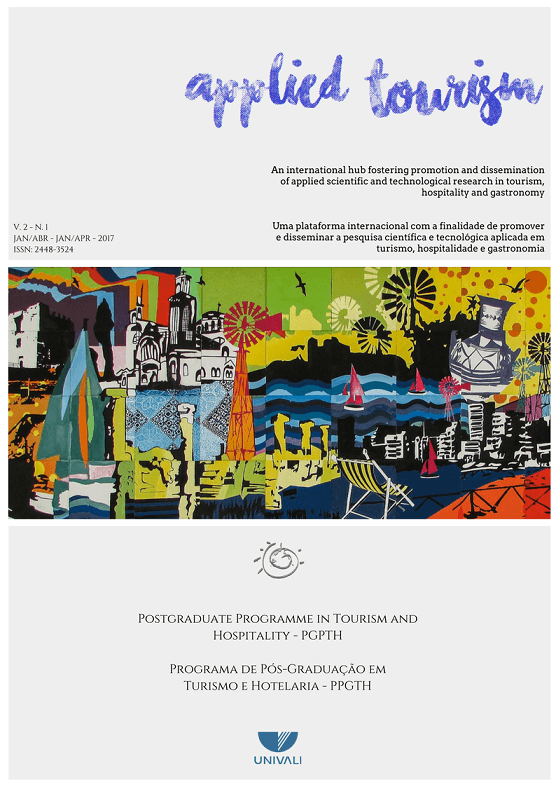O CAMINHO DO VINHO EM SÃO JOSÉ DOS PINHAIS/PR: um território turístico em (trans)formação
DOI:
https://doi.org/10.14210/at.v2n1.p149-175Keywords:
Caminho do Vinho. Turismo rural. Território turístico.Abstract
O turismo enquanto dinâmica social e atividade econômica, é o objeto de investigação deste estudo que tem como cenário a Colônia Mergulhão, em São José dos Pinhais/PR. Trata-se de um território em estado de trans(formação) pelo turismo. Apresenta-se um breve diagnóstico sobre o turismo na Colônia Mergulhão, com base em discussões teóricas acerca do turismo em área rural e as novas relações de produção no espaço rural. Metodologicamente a pesquisa foi construída com base no levantamento de questões específicas sobre essa realidade, mostradas pelos atores envolvidos, a saber: a) A prefeitura municipal; b) Empresários do turismo local; e, c) Associação Caminho do Vinho Colônia Mergulhão (ACAVIM). Revelaram-se os pontos fortes e fracos sobre o turismo na Colônia, assim como as oportunidades e ameaças a que a mesma está exposta. Concluiu-se que o turismo, organizado através do roteiro Caminho do Vinho, possibilitou importantes ganhos para a comunidade e a sua manutenção enquanto principal atividade econômica está baseada na união dos antigos produtores rurais, hoje empresários do turismo. Estes têm em torno da cultura italiana o seu maior diferencial competitivo, que só poderá manter-se sólido através de uma gestão participativa dos envolvidos.
Published
Issue
Section
License
In this term of responsibility I (we) certify the participation in the drafting of the attached article, thereby making public my (our) responsibility for its content. I (we) declare not omitting any connections or financing agreements between I (we) and entities and / or institutions that may have an interest in the publication of this article. I (we) certify that the article is original and that the work, in whole or in part, or any other work with content substantially similar to my (our) authorship, in any other format (printed or electronic), was not sent to another journal and will not be sent while is being considered by the Applied Tourism. In this consent form, the authors give permission to the journal, in the case of approval by the Editorial Board, for the publication of the attached article in hard copy and/or electronic form, in a regular edition of the journal.










